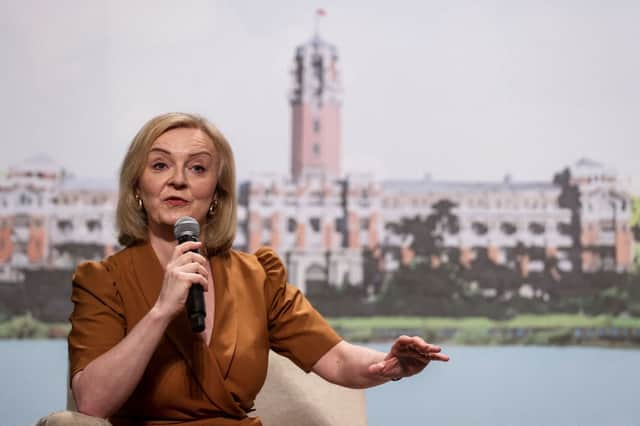UK should designate China a threat to security, Liz Truss says in Taiwan speech
and live on Freeview channel 276
Liz Truss has appealed to her successor Rishi Sunak to take a tougher line on China as she visits Taiwan, which Beijing believes should be under its control.
In a speech in the capital Taipei City on Wednesday morning (May 17), the former Prime Minister said the UK needed to formally designate China as a “threat” to Britain’s security.
Advertisement
Hide AdAdvertisement
Hide AdTruss was expected to try to isolate Beijing on the international stage when she entered Downing Street, before her premiership abruptly ended in the wake of the mini-Budget 44 days later.
She has continued to make her case on the issue, using an appearance at the Copenhagen Democracy Summit on Monday (May 15) to call China “the largest threat that we face to the free world” - accusing Western countries of becoming “too dependent” on it economically.
What did she say?
Truss began her trip to Taiwan - thought to be the first by a former British Prime Minister since Margaret Thatcher visited in the 1990s - by meeting the local Foreign Affairs Minister Joseph Wu.
In her speech, Truss said there were “too many in the West who are trying to cling on to the idea that we can co-operate with China on issues like climate change as if there is nothing wrong” with its stance on freedom of speech and democracy.
Advertisement
Hide AdAdvertisement
Hide AdShe also urged Sunak to fulfil a pledge he made during last summer’s Conservative leadership campaign and close the UK’s 30 Confucius Institutes - which promote Chinese culture on university campuses and in some schools.


Liz Truss has never made any secret of her scepticism about China and its motives on the world stage, NationalWorld’s political editor Tom Hourigan writes. She believes the UK and other Western nations rely on Beijing far too much economically and this - in her view - means the West doesn’t clamp down hard enough on China’s alleged human rights abuses or curbs on free speech.
From Rishi Sunak’s perspective, Truss’ speech in Taiwan is the latest in a series of slightly unhelpful interventions from Conservative MPs on the right of the party who are veering off-message from the backbenches. In recent days alone, Jacob Rees-Mogg has said the new rules on voter ID amount to “gerrymandering” - while Priti Patel has blamed the “centre of the party” for the Tories’ poor showing in the local elections in England.
Sunak has shown he doesn’t want to completely isolate China. Truss feels she has nothing to lose in arguing he should. But some Tory MPs aren’t waiting with bated breath for her intervention. One told me simply: “who cares?”
What is the government’s current view on China?
After moving into Number 10, Sunak adopted a less hardline approach; in March, a UK foreign and defence policy review said China represented an “epoch-defining and systemic challenge” but stopped short of calling it a “threat”.
Last month, Foreign Secretary James Cleverly said the government owed it to future generations to engage with China, and that failing to do so would be a “sign of weakness”. However, he admitted Britain needed to be “unflinchingly realistic” about Beijing’s authoritarian ambitions - including a possible invasion of Taiwan.
Responding to the speech, a government spokesman said ministers had “always been clear that China remains the biggest state-based threat to the UK’s economic security” but it was in the “national interest to continue engagement particularly on issues such as climate change and global health.”


Why does China want control of Taiwan?
Advertisement
Hide AdAdvertisement
Hide AdTaiwan split from China in 1949 following a civil war that ended with the Communist Party controlling the mainland. It’s had democratically-elected presidents for nearly 30 years and sees itself as a key partner of the United States and other Western nations. China now wants to bring Taiwan back under its control, and has indicated it’s prepared to use force if necessary. Analysts believe any future war could draw in the US - and possibly the UK.
Beijing has also taken exception to Western politicians visiting Taipei. Last year, when Nancy Pelosi - then-speaker of the US House of Representatives - made a trip there, China retaliated with a naval and air force blockade of Taiwan. It also cut off communication channels with Washington on a range of issues including maritime security.
Comment Guidelines
National World encourages reader discussion on our stories. User feedback, insights and back-and-forth exchanges add a rich layer of context to reporting. Please review our Community Guidelines before commenting.
